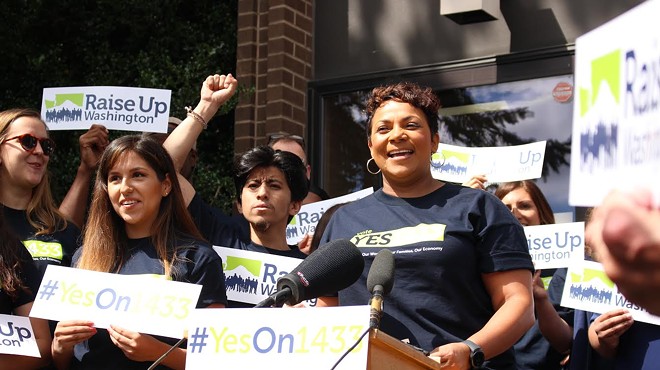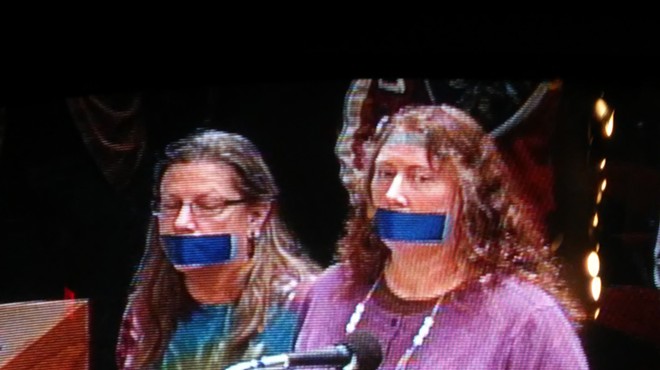Friday, August 19, 2016
Why Raise Up Washington believes it's worth ditching the exemptions from Spokane's sick leave policy

Photo courtesy of Raise Up Washington
April Sims, signature drive director for Raise Up Washington, Olympia helped the group turn in more than 340,000 signatures to qualify I-1433 for the ballot in July
This week we have a story on the fact that, if Raise Up Washington's Initiative 1433 passes, Spokane would not only see its minimum wage go up, it would see its controversial sick-leave policy expanded from three or five days to seven days, with the exemptions and exceptions to the law eliminated.
The exemptions were championed by council members like Karen Stratton, though not without opposition.
“I’m arguing you to, this is still watering it down,” then-Councilmember Jon Snyder had said in January, punctuating his words by pounding the council dais. “We’re making it complicated. We’re adding exemptions.”
This week we chatted with Carlo Caldirola-Davis, campaign manager for Raise Up WA, and Jack Sorensen, the initiative's communication director, about each of the Spokane sick-leave policy's major exemptions, and why the Initiative 1433 doesn't include them.
"Our coalition recognized that every worker in Washington should have access to earned paid sick leave, full stop," says Caldirola-Davis.
So was it a mistake for Spokane to pass its more modest sick leave policy less than a year before the voters voted on the state ballot initiative?
"That is not for us to expound upon. You’d have to ask someone local that question," Caldirola-Davis says. "I think it’s important to recognize that the important work that happened in Spokane and Seattle and other cities was a precursor to 1433. Everything that has moved the ball on paid sick leave has been a positive step toward 1433."
1. The exemption: Small businesses with under 10 employees only have to allow employees to use up to three days of sick leave a year, while businesses with 10 or more employees have to allow workers to use up to five days of sick leave a year. Seattle also has different standards for smaller businesses that would be impacted by the initiative.
Why the Spokane City Council included the exemption: Stratton says she was very concerned about the impact of the initiative on small businesses.
"I think there’s a lot of fear for smaller businesses, the mom-and-pop businesses that have a niche or doing what they want to do and they’re making ends meet," Stratton says. "That’s going to pose a big challenge."
She thinks about the great small-town restaurant in Springdale, the town one of her parents came from, and how they would cope with bigger regulations.
"You worry, how are they going to make it?" Stratton wonders.
Why Raise Up thinks we should ditch it: Sorensen argues that public health concerns don't simply disappear when you have fewer than 10 employees.
"Let’s say I am a restaurant owner and I have eight employees. It is still vitally important to the workers and the community to [provide enough paid sick leave]," Sorensen says. "Seventy percent of all norovirus outbreaks start with food handlers."
City Council President Ben Stuckart says he was fine with losing the exemption, calling the 10 employee cutoff "arbitrary."
2. The exemption: Spokane's sick leave policy wouldn't apply to the people working the building trades, like construction workers.
Why the Spokane City Council included the exemption: Stuckart says he spent a lot of time listening to stakeholders and people at public forums expressing concerns with the policies. One clear message he came away with was the unique aspects of the construction industry. Construction workers are often very migratory, moving from one job site to another and frequently switching employers. This can turn tracking sick leave information into a regulatory nightmare.
"It’s virtually impossible for them to track [sick leave information] when it’s migratory like that," Stuckart says. "I thought that was a good exemption, I’d talked to a lot of people in the construction industry since then, and everybody seemed to get that."
Why Raise Up thinks we should ditch it: "I hear that point," Caldirola-Davis says. "Our rebuttal would simply be that construction workers
The Raise Up Washington team points out that sick leave can't be taken until 90 days on the job, and that it's earned with time. In fact, under the Raise Up Washington sick leave policy workers would actually earn sick leave a little more slowly than under Spokane's policy. Spokane's policy allowed workers to earn an hour of sick leave for every 30 hours worked, while workers under the Raise Up policy wouldn't earn an hour of sick leave until they work 40 hours.
3. The exemption: Spokane's sick leave policy wouldn't apply to startups during their first year of business.
Why the Spokane City Council included the exemption: "I’ve heard from startups. It’s the hardest for the first year," Stratton said when introducing the amendment to the City Council last year. To help startups survive without having to navigate the regulatory hurdle of a sick leave policy, Stratton thought a one-year delay would be reasonable.
Why Raise Up thinks we should ditch it: They argue the issue should be looked at from the worker's perspective.
"I think fundamentally, whether you're a worker at a startup or a worker at Boeing, if you’re sick or you have a child that’s sick, you need to stay home from work and be with the child," Caldirola-Davis says. "No worker should have to choose between going to work sick or missing a paycheck."
They also argue that sick leave mandates have been put in place in nearly two-dozen other cities, including San Francisco and Seattle, and say that studies have not shown major negative impacts on employers or employees.
They point to left-leaning business groups like the Greater Seattle Business Association and the Main Street Alliance, who have supported the policy.
"If you ask small business owners, they’ll tell you that high turnover can be a huge cost of running a business," Sorensen says. And he believes this initiative, with its minimum wage hike and mandatory sick-leave policy, will actually help employers by reducing turnover and saving on training costs.
However, the decision to not include exemptions to the policy has given the opposition an argument to use against it. Here's a statement from Don Skillman, spokesman for Northwest Initiatives, the campaign opposing 1433.
“I-1433 is a blunt force instrument that fails to accommodate seasonal industries, like construction, that can't afford this new mandate. It's a one-size-fits-all proposal designed for downtown Seattle that the rest of the state can't afford to absorb.
At least the City of Spokane's ordinance recognizes the need to exempt certain industries and puts an annual cap on the amount of leave that can be accrued and used. Initiative 1433 is poorly crafted and should be rejected so cities can choose the approach that works best for their communities.”
Tags: sick leave , Raise Up Washington , News , Image



























